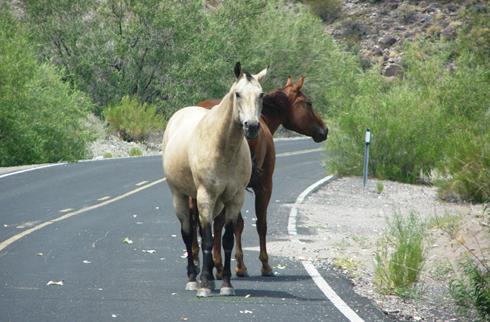
Abandoned horses are on the rise
By Jeff DeLong, USA TODAY

Jack Noble was pretty sure what he would see when he arrived to check out reports of horses abandoned on a rural road in Oregon's Willamette Valley in September. Noble, field operations manager for the state's Department of Agriculture, found 11 filthy, sickly and starving horses. "They were just let loose, and they were severely malnourished," he said.
Horse abandonment is on the rise across the USA, livestock and agricultural officials say. As the economy worsens and the cost of feeding and caring for horses rises, more people are abandoning their animals into the wild, where many starve and die. No national numbers are available, but there are "definitely thousands of them out there," said Dave Duquette, an Oregon horse trainer and president of the United Horsemen's Front. "Folks have to decide whether to feed the kids or feed the horses," said Dr. Kerry Rood, a veterinarian at Utah State University.
In Wyoming, there have been "huge increases" in the number of domestic horses abandoned, said Jim Schwartz, director of the Wyoming Livestock Board. "It used to be six or eight per year. This year so far we've had at least 41," said Lee Romsa, Wyoming's brand commissioner. In Nevada, officials have found 63 abandoned horses in the northern part of the state alone in 2008 — an unprecedented situation, said Ed Foster, spokesman for the state Department of Agriculture. The horses Noble found were sold at auction, surprising considering their condition, he said.
The responsibility for dealing with abandoned domestic horses generally falls to a state's department of agriculture or a local animal control organization, Rood said. Private animal rescue organizations often become involved, he said. The sale of horses is becoming "less and less" of an option, said Patricia Evans, equine specialist at Utah State. Auctioneers screening horses are turning them away if they don't think they will bring enough money, she said. Rood said another part of the abandonment problem is the closure of the USA's last horse slaughterhouse last year in Illinois. Slaughtering provided owners with a final option, he said.
Bruce Friedrich of People for the Ethical Treatment of Animals (PETA) said closure of American horse slaughterhouses was a necessary end to a "horrifically abusive" practice. Many horse owners believe their animals, if released into the wild, will be adopted by wild herds. But "the wild horse herd will reject them in the most violent manner," Foster said. "It ends up being a bad ending for that horse."
DeLong reports for the Reno Gazette-Journal